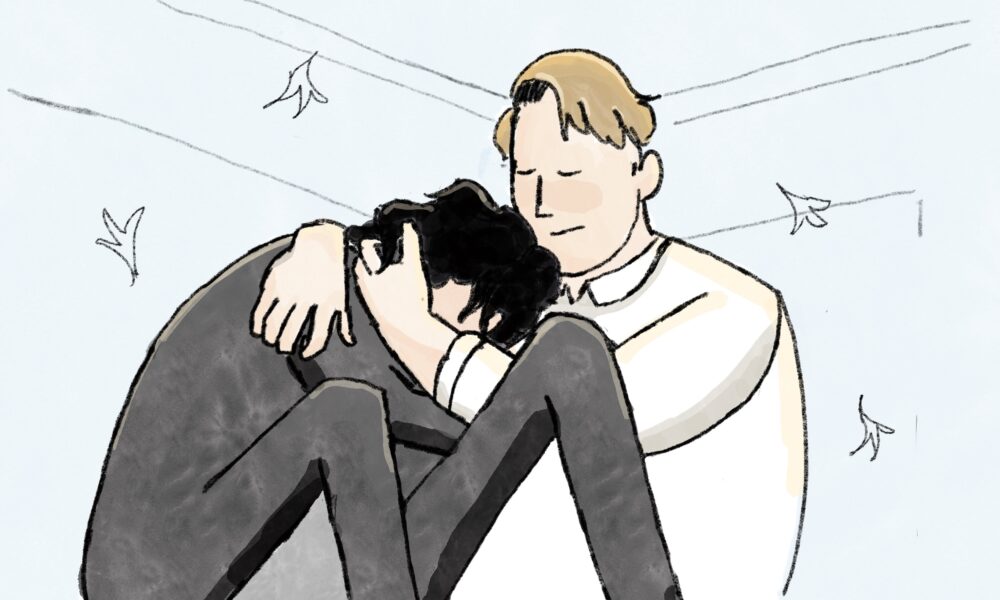With innocent, warm charm, Heartstopper Season 3 thoughtfully guides its audience alongside Nick and Charlie’s love boat as the young couple steers toward adulthood. The new season introduces more mature content, but its foundations remain rooted in the light innocence that first won viewers’ hearts. As their relationship deepens, Nick and Charlie navigate the universal struggles of codependency, desire, and mental health, testing the true strength of their bond. Altogether, the audience ebbs along the twisting tides of queer love, deepening their understanding of intimacy and attachment.
Heartstopper excels in its portrayal of the teenage experience, using its warm, genuine tone to address some of life’s most difficult themes. This season, adapted from Volumes Four and Five of Alice Oseman’s comic series, centres on Charlie’s struggles with Obsessive-Compulsive Disorder (OCD) and anorexia, and Nick’s anxiety about supporting him as his boyfriend. Rather than focusing solely on Charlie, the show emphasizes his health’s ripple effect on others.
The fourth episode, “Journey,” is a standout of the season. The episode is narrated from two distinct perspectives—first by Nick and then by Charlie—allowing the audience to experience the same events through the eyes of both characters.
Nick’s perspective offers insight into the pressure and worry he feels in trying to support Charlie as he is away receiving inpatient care at a treatment centre. We see Nick struggle with his desire to be present for Charlie while carrying the burden of his own emotions and fears about how best to care for his boyfriend. Alternatively, through Charlie’s perspective, we get a glimpse into the overwhelming isolation and guilt he experiences during his treatment. A deep sense of unworthiness clouds his thoughts, convincing him that his struggles burden those he loves. Charlie’s narration reveals how he internalizes these mental health challenges, feeling disconnected from the world around him and questioning whether Nick’s love for him is truly enough to bear the weight of his pain.
This dynamic emphasizes the importance of community and support, a refreshingly different take from the way much teenage media reduces mental health struggles to a mere aesthetic ideal. In Heartstopper, the support Charlie receives from his friends when he gets out of treatment highlights a crucial aspect of healing: Togetherness. The show reminds us that romanticizing struggle doesn’t solve the teenage mental health crisis; it only normalizes it. This season in particular demonstrates that true support comes from working together to uplift our loved ones in their hardest moments.
The season’s final episode, “Apart,” highlights another layer of relationship complexity through Charlie and his sister Tori, whose dynamic offers a parallel exploration of love and responsibility. Tori’s overinvestment in her brother’s recovery reflects how easily care and selflessness can blur into a loss of personal identity. As Charlie begins to heal and reclaim his individuality, Tori struggles to adjust, her sense of purpose tied to being his steadfast support. In a heartwarming scene on a ferris wheel, Charlie reassures her, “You have so much love to give; you don’t have to give it all to me.” Her reply, “I’d do it all again,” encapsulates the strength of their bond while illustrating the importance of balance in relationships—caring for others without losing oneself.
Charlie’s journey captures this beautifully: After two months away, he’s had the time to reconnect with himself and strengthen his individuality. He grows confident enough to wear a t-shirt for his band’s performance at the school fair, a noticeable change from the oversized jumpers he had used as body camouflage throughout the show, and a confidence boost all loyal viewers can appreciate.
Heartstopper offers a rare and hopeful reminder in a polarized age of media: Love, though challenging, is deeply rewarding. By exploring themes of mental health, self-growth, and the strength of community, the series captures the complexities of human connection in a way that feels both deeply personal and universally resonant. As Nick and Charlie continue to grow together and apart, Heartstopper reminds us that love is not just about enduring hardships: It’s about rising above them together.









